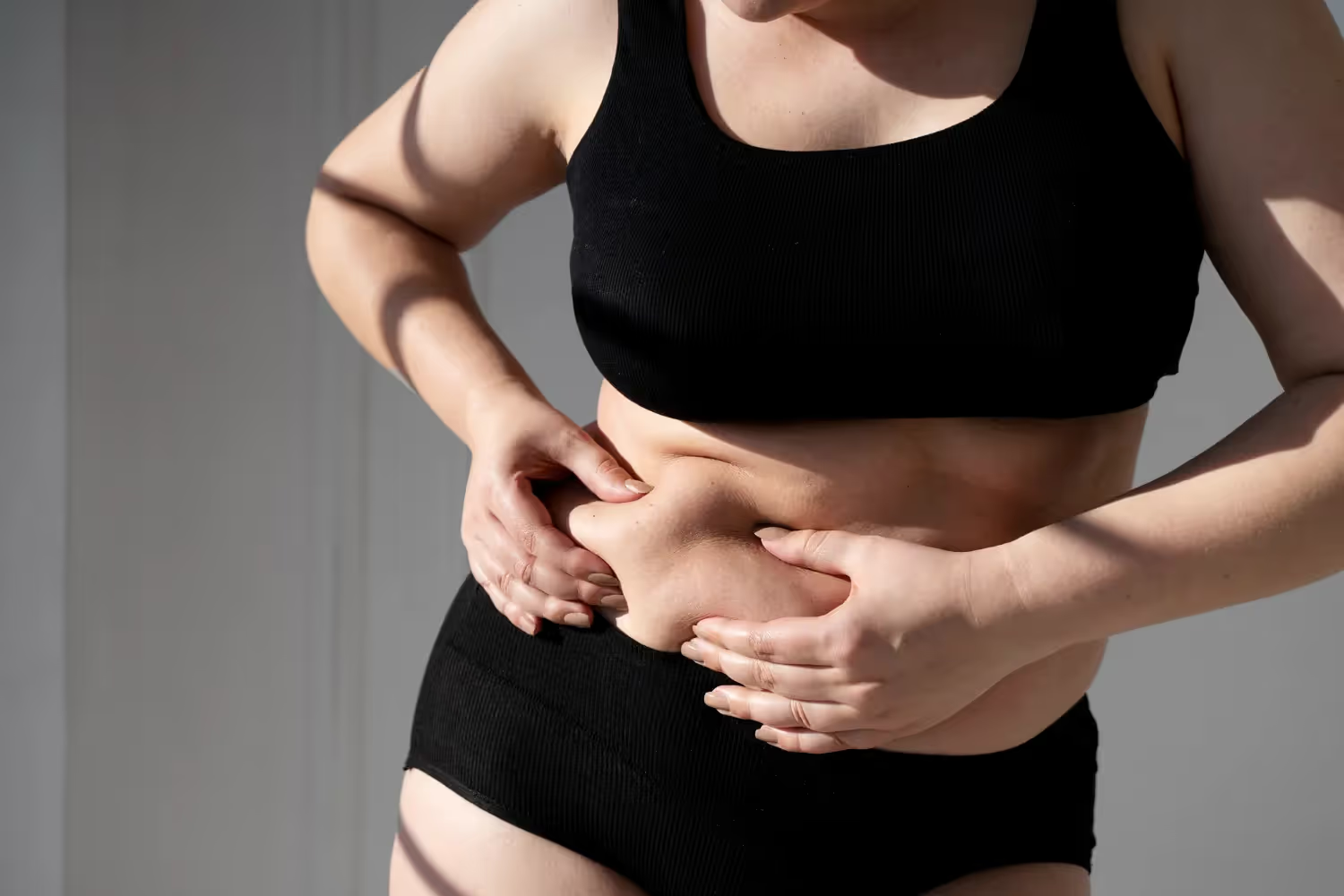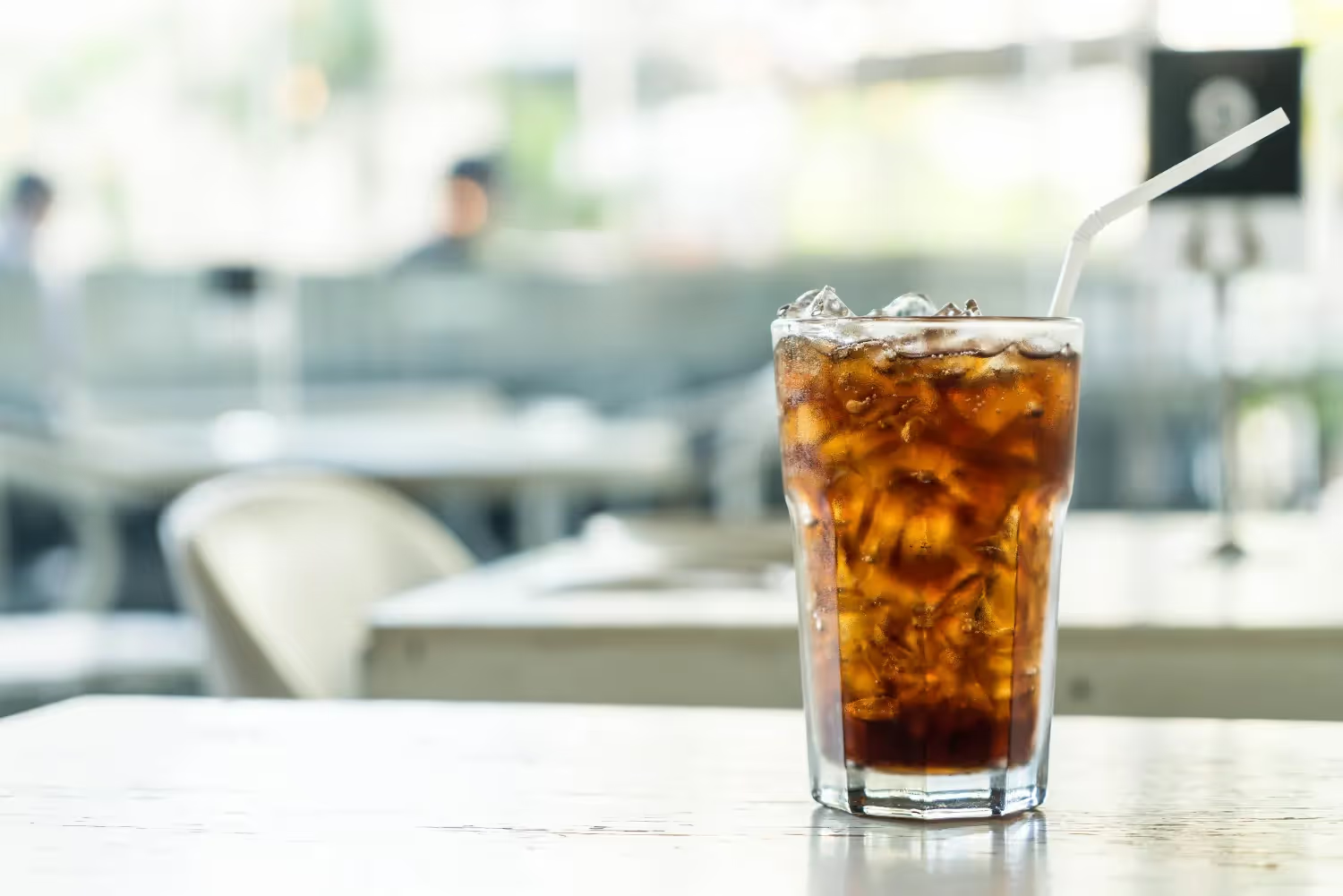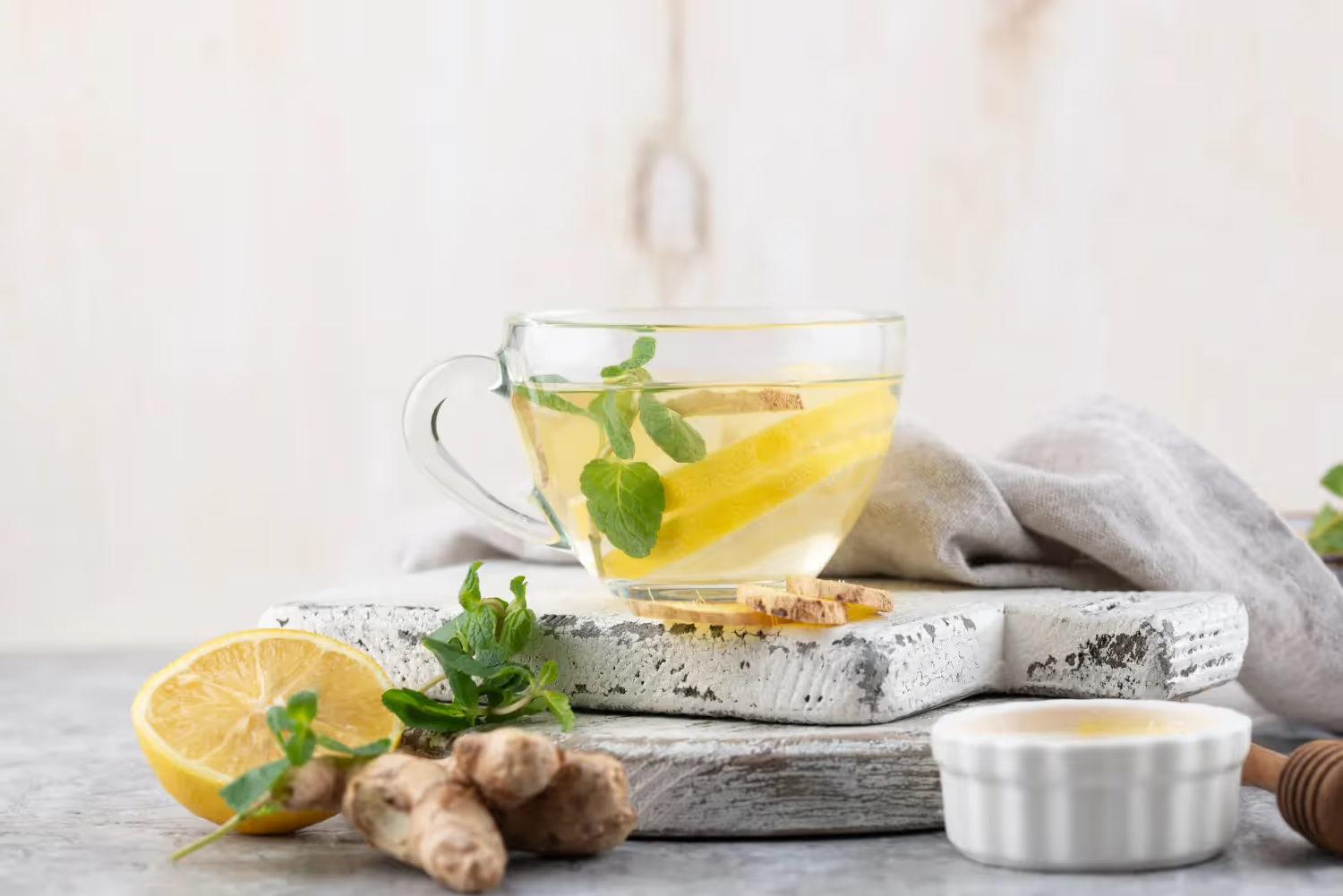Weight loss that fits your goals and your life.
Get your plan
Weight loss that fits your goals and your life.
Get your plan
Are you currently experiencing the effects of weight gain that come with menopause, with the increased appetite, and sudden weight gain seemingly happening overnight?
Then you are not alone, as studies show 60%–70% of women experience weight gain during menopause, with hormonal changes affecting metabolism, insulin sensitivity, and water retention.
One way to address this is with drinks, which support hydration, digestion, and appetite regulation. Not to be used as a quick fix, drinks alongside a nutrient-dense diet can provide the support needed to support weight loss.
In this article, we discuss the 7 best drinks for menopause weight loss. We cover how menopause affects weight loss, ingredients to avoid, and drink timing to support weight loss.
How Menopause Affects Weight Loss

The decrease of estrogen during menopause can lead to increased appetite and weight gain. Studies show it affects lipid (fat) metabolism, energy consumption, insulin resistance, and body composition.
Here the body shifts from a gynaecoid shape (fat distributed around the hips, thighs, and buttocks) to an android body shape (fat stored around the midsection).
During this time, evidence shows women experience a weight gain of 1 pound per year which alters body shape further.
What makes losing weight during menopause challenging is not just the shift in weight distribution, but rather the loss of fat-free mass and reduced resting energy expenditure.
Below is what studies show is the breakdown of our daily energy expenditure:
- Resting metabolic rate: 60–70%
- Thermic effect of meals: 8–15%
- Non-exercise activity thermogenesis (NEAT) (daily activities): 15–50%
- Exercise activity thermogenesis: 15–30%
The majority of energy expenditure comes from your resting metabolic rate (60–70%), consumed to support the body’s basic functions.
Resting energy expenditure is shown to steadily decline by 1–2% per decade after 20, due to a reduction in fat-free mass from the bones, muscle, brain, kidney, and liver.
For context, both our brain and muscles contribute to our resting energy expenditure. Sources show that despite the brain only making up 2% of our total body mass, it consumes 20% of our metabolic energy. Meanwhile, further sources indicate that muscle mass accounts for 20% of our resting energy expenditure.
Research reveals that brain mass gradually declines after 40 by approximately 5% per decade, reducing energy requirements. Muscle mass sees a similar decline, with evidence highlighting a 3–8% per decade after 3. Further studies show this is made worse during menopause due to an imbalance of muscle protein synthesis and breakdown, which is the result of the decline in sex hormones, and increasing oxidative stress.
These factors combine, significantly decreasing resting energy expenditure, and making it challenging to lose weight.
7 Best Drinks for Menopause Weight Loss

Different drinks are great for infusing the body with vital nutrients, supporting the body during menopause, and aiding in weight loss. Below, we list the 7 best drinks for menopause weight loss to help you start achieving your weight loss goals.
1 Green Tea and Its Thermogenic Effect
Green tea is an excellent, near-zero calorie drink (1 kcal) that can increase metabolism. As mentioned, the thermic effect of meals contributes to roughly 8–15% of daily energy expenditure.
Research shows that green tea can increase thermogenesis by 35–43% (75–100 kcal). This effect is attributed to its caffeine content which stimulates the sympathetic nervous system which releases adrenaline.
Additional evidence echoes these findings, stating that caffeine activates the sympathetic nervous system, promoting fat oxidation. This makes it a fantastic drink to promote energy expenditure without the need to consume calories.
For the best health benefits, boil water, then let it cool before pouring it over tea leaves and soak them for 2–3 minutes to avoid bitterness.
2 Lemon Water for Digestion and Detox
Lemon water has long been associated with improved digestion and detoxification. However, it does this in a way you may not think.
Firstly, there is little evidence to support lemon water for detoxification. But what it does is maintain hydration, and fullness, and provide the body with vitamin C.
Drinking water before a meal is shown to reduce the amount of food consumed and stop the intake of sugary, calorie-dense drinks such as sodas and fruit juices, improving weight control. This can also improve digestion, shape the gut microbiome, and reduce constipation.
The great thing about vitamin C is it has several roles within the body. It is shown to protect against free radicals, thwarting the development of chronic diseases such as cardiovascular diseases, aging, heart disease, cancer, and inflammation.
Sources reveal it also contributes to iron absorption, hormone production, and protein metabolism, and serves to the synthesis of collagen and L-carnitine, supporting many of the body’s systems to optimize health and well-being.
To make lemon water, juice a lemon or thinly slice it and add it to a glass of water.
3 Apple Cider Vinegar and Blood Sugar Control
Apple cider vinegar is often for its health benefits, with research revealing its anti-obesity, anti-bacterial, antifungal, cardiovascular, anti-cancer, and anti-Alzheimer’s properties.
It is also shown it may lower blood sugar levels with type 2 diabetes. To take advantage of these benefits, simply add 1–2 tablespoons (8 oz) to water.
4 Ginger and Peppermint Teas for Bloating Relief
Ginger and peppermint tea is a fantastic drink for relieving bloating. Research shows that ginger can improve bloating and related symptoms like constipation, nausea and abdominal pain.
Meanwhile, additional sources reveal it can reduce pressure on the lower esophageal sphincter, reducing intestinal cramping, indigestion, flatulence, and bloating.
Peppermint exhibits a similar effect, with studies revealing the benefits of peppermint oil as an effective treatment that can provide relief for irritable bowel syndrome symptoms including bloating, abdominal pain, and constipation.
To make ginger tea, thinly slice ginger and combine in a saucepan with water. Bring to a boil over high heat and then lower heat and simmer for five minutes then strain to remove ginger. This can be served with lemon and/or honey.
For peppermint tea, boil water in a pan, then turn off the heat and add peppermint leaves for 5 minutes then strain into cups to remove leaves.
Peppermint and ginger can also be combined in tea, with the addition of lemon to harness the benefits of each ingredient.
5 Electrolyte Waters to Reduce Cravings
Electrolyte drinks like sports drinks and coconut water can reduce cravings. As mentioned, water intake before meals can reduce energy intake.
Meanwhile, studies show that electrolytes such as sodium, potassium, chloride, magnesium, calcium, phosphate, and bicarbonates are vital for basic function, maintaining cell health, and the action potential (electrical current between nerve and muscle). When we experience dehydration, it can affect energy levels and concentration which can lead to cravings.
Electrolyte waters can provide the body with electrolytes to support health and reduce cravings. This leads to fewer calories consumed, improving weight management.
6 High-Protein Shakes to Curb Hunger and Support Muscle
High-protein shakes are excellent for curbing hunger and supporting lean muscle mass. Research shows that high-protein diets can increase fullness and increase thermogenesis, which is when the body burns energy to produce heat.
Regarding muscle support, studies show that increased protein intake contributes to increased muscle mass and strength when combined with strength training.
Maintaining muscle mass helps maintain resting energy expenditure. This combined with less hunger, and increased metabolism creates a powerful mechanism that can enhance weight loss.
For a high-protein shake consider using animal or plant-based protein supplements. These come in powder form, and contain 25–30 grams of protein, with very few calories which makes them excellent for weight loss.
7 Cinnamon and Turmeric Lattes for Inflammation
Cinnamon and turmeric lattes are a great drink for reducing inflammation. Inflammation is a healthy part of the healing process, however, when it is prolonged it can lead to age-related diseases.
Sources show that cinnamon and its components may be useful for age-related inflammatory conditions. Meanwhile, turmeric contains the natural compound curcumin which is shown to have anti-inflammatory properties.
Combining these two ingredients in lattes doubles the anti-inflammatory effects which can be beneficial for women during menopause.
To make cinnamon and turmeric lattes, pour soy milk (or equivalent) over medium heat in a pan and add ¼ teaspoon of cinnamon powder, and ¼ teaspoon of turmeric powder. Simmer for 2–5 minutes, stirring, and avoiding boiling over. Then pour into a mug.
What to Avoid

Several drinks can be beneficial for weight loss. However, this is only half the picture. Below, we list what to avoid in drinking during menopause weight loss to improve your health and increase your chances of success.
Sugary Beverages and Insulin Spikes
Sugar drinks not only spike insulin, but they consume valuable calories. Research shows that sugar-sweetened beverages are associated with type 2 diabetes, as they increase blood glucose and insulin concentration leading to high glycemic loading. This can stimulate hunger and lead to weight gain, glucose intolerance, and insulin resistance.
Sugary drinks are also calorie-dense. This poses a problem during weight loss, as fat loss requires a calorie deficit (consuming fewer calories than basal metabolic rate).
When you consume sugary drinks, you not only use up the limited calories you have, but you also spike energy levels, which come crashing down shortly after, leading to a calorie blowout.
Artificial Sweeteners and Gut Health Concerns
Artificial sweeteners (non-nutritive sweeteners) found in diet sodas, yogurt, breakfast cereal, baked goods, and candy may negatively impact gut health. Research indicates that there are links to imbalances in the gut, however, the research is mixed.
Diet or low-calorie soda can be excellent substitutes that can make it feel like you are still having the real thing. However, due to the potential impacts on gut health, we recommend they be consumed rarely or in moderation.
Alcohol’s Effect on Hormones and Fat Storage
Alcohol can have major negative effects on hormone and fat storage. A 2013 study shows that chronic consumption of alcohol disrupts the communication between the nervous, endocrine, and immune systems, leading to hormonal imbalances. This can lead to stress, reproductive issues, thyroid problems, immune dysfunction, cancer, and behavioral and psychological disorders.
Alcohol can also affect, and contribute to fat storage and weight gain. Studies show that alcohol is recognized for developing obesity, promoting abdominal fat distribution.
We recommend consuming alcohol in moderation or reducing it significantly to avoid these negative effects.
Timing and Drinking Habits That Support Fat Loss
Timing your drinks can have positive effects on your body and support fat loss. Below, we discuss what drinks to have at different times to boost metabolism, reduce appetite, and improve sleep, and hormone health.
Morning Metabolism-Boosting Drinks
Morning is the perfect time to hydrate and boost your metabolism. First off, water should always be prioritized as it is not only easily accessible but has many benefits, one being the metabolism boost.
Drinking water is proven to sitmulate the sympathetic nervous system, which increasing our metabolic rate. Water is also essential for metabolizing stored fat into energy. Consuming a glass each morning and throughout the day can provide your body with a natural boost.
Green tea and apple cider vinegar also may be excellent additions to your morning hydration ritual. As mentioned, green tea contains caffeine, providing a boost to metabolism, while adding 1–2 tablespoons of apple cider vinegar may help lower blood sugar levels.
Pre-Meal Sips to Curb Appetite
Sipping water before meals can curb appetite. Water is a natural appetite suppressant, with research highlighting a 13% reduction in energy intake.
When this is practiced across each meal, it can contribute to a major reduction of calories, which contributes to a calorie deficit, improving fat loss.
Nighttime Teas That Support Sleep and Hormones
Drinking nighttime tea before bed is an excellent way to support sleep and hormones. Teas such as peppermint, chamomile, and lavender promote relaxation, reducing stress for a restful night’s sleep.
Meanwhile, teas including spearmint, chamomile, and raspberry leaf can help balance hormones, improving menstrual cycles, and symptoms.
Recap and Final Tips

Healthy drinks are excellent for supporting weight loss during menopause, providing incredible benefits such as improved digestion, enhanced metabolism, and appetite suppression.
Summary of Effective Drinks
Here is a summary of the seven best drinks for menopause weight loss:
- Green tea (thermogenesis)
- Lemon water (digestion and detox)
- Apple cider vinegar (blood sugar control)
- Ginger and peppermint teas (bloating relief)
- Electrolyte waters (reduce cravings)
- High-protein shake (curb hunger and support muscle)
- Cinnamon and turmeric lattes (inflammation)
Smart Habits for Lasting Results
Healthy drinks can have a profound impact on your health, however, they shouldn’t be your only intervention for effective weight loss. Here is a list of smart habits, to help you achieve your weight loss goals:
- Track progress (weight, measurements, photos, sleep, energy levels, and mood)
- Eat in a calorie deficit
- Eat a nutrient-dense, balanced diet consisting of protein, complex carbohydrates, and healthy fats
- Consume 25–30 grams of protein in each meal
- Limit processed food (saturated and trans fats)
Where to Learn More or Get Expert Help
To learn more about healthy drinks, nutrition, and how they can help support menopause weight loss, explore the Reverse Health blog. Additionally, if you would like an in-depth look, we recommend consulting a dietician, or nutritionist.
Weight loss that fits your goals and your life.
Get your plan
Sources
Sources
- Kodoth, V., Scaccia, S., & Aggarwal, B. (2022). Adverse changes in body composition during the menopausal transition and relation to cardiovascular risk: A contemporary review. Women's Health Reports (New Rochelle), 3(1), 573–581. https://doi.org/10.1089/whr.2021.0119. https://pmc.ncbi.nlm.nih.gov/articles/PMC9258798/
- Opoku, A. A., Abushama, M., & Konje, J. C. (2023). Obesity and menopause. Best Practice & Research Clinical Obstetrics & Gynaecology, 88, 102348. https://doi.org/10.1016/j.bpobgyn.2023.102348. https://www.sciencedirect.com/science/article/pii/S1521693423000482
- Knight, M. G., Anekwe, C., Washington, K., Akam, E. Y., Wang, E., & Stanford, F. C. (2021). Weight regulation in menopause. Menopause, 28(8), 960–965. https://doi.org/10.1097/GME.0000000000001792. https://pmc.ncbi.nlm.nih.gov/articles/PMC8373626/
- Manini, T. M. (2009). Energy expenditure and aging. Ageing Research Reviews, 9(1), 1–11. https://doi.org/10.1016/j.arr.2009.08.002. https://pmc.ncbi.nlm.nih.gov/articles/PMC2818133/
- Padamsey, Z. and Rochefort, N.L. (2023) ‘Paying the brain's energy bill’, Current Opinion in Neurobiology, 78, p. 102668. https://doi.org/10.1016/j.conb.2022.102668. https://www.sciencedirect.com/science/article/pii/S0959438822001623
- Mason, J. B. (2010). Nutritional Assessment and Management of the Malnourished Patient. In M. Feldman, L. S. Friedman, & L. J. Brandt (Eds.), Sleisenger and Fordtran's Gastrointestinal and Liver Disease (9th ed., Vol. 1, pp. 47–75.e4). Elsevier. https://www.sciencedirect.com/science/article/abs/pii/B9781416061892000044
- Peters, R. (2006). Ageing and the brain. Postgraduate Medical Journal, 82(964), 84–88. https://doi.org/10.1136/pgmj.2005.036665. https://pmc.ncbi.nlm.nih.gov/articles/PMC2596698/
- Volpi, E., Nazemi, R., & Fujita, S. (2004). Muscle tissue changes with aging. Current Opinion in Clinical Nutrition and Metabolic Care, 7(4), 405–410. https://doi.org/10.1097/01.mco.0000134362.76653.b2. https://pmc.ncbi.nlm.nih.gov/articles/PMC2804956/
- Woods, R., Hess, R., Biddington, C. et al. Association of lean body mass to menopausal symptoms: The Study of Women's Health Across the Nation. womens midlife health 6, 10 (2020). https://doi.org/10.1186/s40695-020-00058-9. https://womensmidlifehealthjournal.biomedcentral.com/articles/10.1186/s40695-020-00058-9#citeas
- Jówko, E. (2015) ‘Green Tea Catechins and Sport Performance’, in Lamprecht, M. (ed.) Antioxidants in Sport Nutrition. Boca Raton, FL: CRC Press, pp. 153–170. https://doi.org/10.1201/b18172-10. https://www.ncbi.nlm.nih.gov/books/NBK299060/
- Dulloo, A.G., Duret, C., Rohrer, D., Girardier, L., Mensi, N., Fathi, M., Chantre, P. and Vandermander, J. (1999) ‘Efficacy of a green tea extract rich in catechin polyphenols and caffeine in increasing 24-h energy expenditure and fat oxidation in humans’, The American Journal of Clinical Nutrition, 70(6), pp. 1040–1045. https://doi.org/10.1093/ajcn/70.6.1040. https://www.sciencedirect.com/science/article/pii/S0002916522042022
- Jeong, J.N. (2018) ‘Effect of pre-meal water consumption on energy intake and satiety in non-obese young adults’, Clinical Nutrition Research, 7(4), pp. 291–296. https://doi.org/10.7762/cnr.2018.7.4.291. https://pmc.ncbi.nlm.nih.gov/articles/PMC6209729/
- Zehiroglu, C. and Ozturk Sarikaya, S.B. (2019) ‘The importance of antioxidants and place in today’s scientific and technological studies’, Journal of Food Science and Technology, 56(11), pp. 4757–4774. https://doi.org/10.1007/s13197-019-03952-x. https://pmc.ncbi.nlm.nih.gov/articles/PMC6828919/
- Office of Dietary Supplements (ODS), 2024. Vitamin C - Fact Sheet for Health Professionals. National Institutes of Health. https://ods.od.nih.gov/factsheets/VitaminC-HealthProfessional/
- Tripathi, S. (2023) ‘Health Benefits and Modern Applications of Apple Cider Vinegar: A Four-Decade Review of the Scientific Literature (Review Article on Bibliometric Investigation of Apple Cider Vinegar)’, August 2023. Maharana Pratap College of Pharmacy. https://www.researchgate.net/publication/373601964_Health_Benefits_and_Modern_Applications_of_Apple_Cider_Vinegar_A_Four-Decade_Review_of_the_Scientific_Literature_Review_Article_on_Bibliometric_Investigation_of_Apple_Cider_Vinegar
- Jafarirad, S., Elahi, M.-R., Mansoori, A., Khanzadeh, A. and Haghighizadeh, M.-H. (2023) ‘The improvement effect of apple cider vinegar as a functional food on anthropometric indices, blood glucose and lipid profile in diabetic patients: a randomized controlled clinical trial’, Frontiers in Clinical Diabetes and Healthcare, 4, p. 1288786. doi:10.3389/fcdhc.2023.1288786. https://pmc.ncbi.nlm.nih.gov/articles/PMC10679383/
- Foshati, S., Poursadeghfard, M., Heidari, Z. and Amani, R. (2023) ‘The effects of ginger supplementation on common gastrointestinal symptoms in patients with relapsing-remitting multiple sclerosis: a double-blind randomized placebo-controlled trial’, BMC Complementary Medicine and Therapies, 23, Article number: 383. doi:10.1186/s12906-023-04278-4. https://bmccomplementmedtherapies.biomedcentral.com/articles/10.1186/s12906-023-04227-x
- Bodagh, M.N., Maleki, I. and Hekmatdoost, A. (2019) ‘Ginger in gastrointestinal disorders: A systematic review of clinical trials’, Food Science & Nutrition, 7(1), pp. 96–108. doi:10.1002/fsn3.807. https://pmc.ncbi.nlm.nih.gov/articles/PMC6341159/
- Cash, B.D., Epstein, M.S. and Shah, S.M. (2016) ‘A novel delivery system of peppermint oil is an effective therapy for irritable bowel syndrome symptoms’, Digestive Diseases and Sciences, 61, pp. 560–571. doi:10.1007/s10620-015-3858-7. https://link.springer.com/article/10.1007/s10620-015-3858-7
- Shrimanker, I. and Bhattarai, S. (2023) Electrolytes. StatPearls [Internet]. Treasure Island (FL): StatPearls Publishing. Available at: https://www.ncbi.nlm.nih.gov/books/NBK541123/
- Halton, T.L. and Hu, F.B. (2004) ‘The effects of high protein diets on thermogenesis, satiety and weight loss: a critical review’, Journal of the American College of Nutrition, 23(5), pp. 373–385. doi: 10.1080/07315724.2004.10719381. https://pubmed.ncbi.nlm.nih.gov/15466943/
- Carbone, J.W. and Pasiakos, S.M. (2019) ‘Dietary protein and muscle mass: Translating science to application and health benefit’, Nutrients, 11(5), p. 1136. doi: 10.3390/nu11051136. https://pmc.ncbi.nlm.nih.gov/articles/PMC6566799/
- Gunawardena, D., Karunaweera, N., Lee, S., van Der Kooy, F., Harman, D.G., Raju, R., Bennett, L., Gyengesi, E., Sucher, N.J. and Münch, G. (2015) ‘Anti-inflammatory activity of cinnamon (C. zeylanicum and C. cassia) extracts – identification of E-cinnamaldehyde and o-methoxy cinnamaldehyde as the most potent bioactive compounds’, Food & Function, 6(3), pp. 910–919. doi: 10.1039/c4fo00680a. https://pubmed.ncbi.nlm.nih.gov/25629927/
- Peng, Y., Ao, M., Dong, B., Jiang, Y., Yu, L., Chen, Z., Hu, C. and Xu, R. (2021) ‘Anti-inflammatory effects of curcumin in the inflammatory diseases: status, limitations and countermeasures’, Drug Design, Development and Therapy, 15, pp. 4503–4525. doi: 10.2147/DDDT.S327378. https://pmc.ncbi.nlm.nih.gov/articles/PMC8572027/
- Tseng TS, Lin WT, Gonzalez GV, Kao YH, Chen LS, Lin HY. Sugar intake from sweetened beverages and diabetes: A narrative review. World J Diabetes. 2021 Sep 15;12(9):1530-1538. doi: 10.4239/wjd.v12.i9.1530. PMID: 34630905; PMCID: PMC8472506. https://pmc.ncbi.nlm.nih.gov/articles/PMC8472506/
- Ruiz-Ojeda FJ, Plaza-Díaz J, Sáez-Lara MJ, Gil A. Effects of Sweeteners on the Gut Microbiota: A Review of Experimental Studies and Clinical Trials. Adv Nutr. 2019 Jan 1;10(suppl_1):S31-S48. doi: 10.1093/advances/nmy037. Erratum in: Adv Nutr. 2020 Mar 1;11(2):468. doi: 10.1093/advances/nmz112. PMID: 30721958; PMCID: PMC6363527. https://pmc.ncbi.nlm.nih.gov/articles/PMC6363527/
- Rachdaoui N, Sarkar DK. Effects of alcohol on the endocrine system. Endocrinol Metab Clin North Am. 2013 Sep;42(3):593-615. doi: 10.1016/j.ecl.2013.05.008. PMID: 24011889; PMCID: PMC3767933. https://pmc.ncbi.nlm.nih.gov/articles/PMC3767933/
- Martínez-Urbistondo, D., Perez-Diaz-del-Campo, N., Landecho, M.F. and Martínez, J.A., 2024. Alcohol drinking impacts on adiposity and steatotic liver disease: concurrent effects on metabolic pathways and cardiovascular risks. Current Obesity Reports, 13, pp.461–474. https://doi.org/10.1007/s13679-024-00524-z. https://link.springer.com/article/10.1007/s13679-024-00560-5
- Vij VA, Joshi AS. Effect of 'water induced thermogenesis' on body weight, body mass index and body composition of overweight subjects. J Clin Diagn Res. 2013 Sep;7(9):1894-6. doi: 10.7860/JCDR/2013/5862.3344. Epub 2013 Sep 10. PMID: 24179891; PMCID: PMC3809630. https://pmc.ncbi.nlm.nih.gov/articles/PMC3809630/
- Davy BM, Dennis EA, Dengo AL, Wilson KL, Davy KP. Water consumption reduces energy intake at a breakfast meal in obese older adults. J Am Diet Assoc. 2008 Jul;108(7):1236-9. doi: 10.1016/j.jada.2008.04.013. PMID: 18589036; PMCID: PMC2743119. https://pmc.ncbi.nlm.nih.gov/articles/PMC2743119/
FAQs
What are the best drinks to lose weight during menopause?
Hydrating options like green tea, lemon water, and protein shakes can support fat loss and hormonal balance.
Can certain drinks help with belly fat in menopause?
Yes. Drinks rich in antioxidants or protein can reduce inflammation and support metabolism in midlife.
Is green tea good for menopause weight loss?
Absolutely. It boosts metabolism, reduces cravings, and supports fat oxidation — ideal for women over 40.
How do protein shakes support fat loss in menopause?
They help preserve muscle mass, increase satiety, and stabilize blood sugar, which aids recomposition.
Should I avoid sugary drinks during menopause?
Yes. Sugary drinks spike insulin, worsen belly fat, and disrupt hormonal balance, especially post-40.







